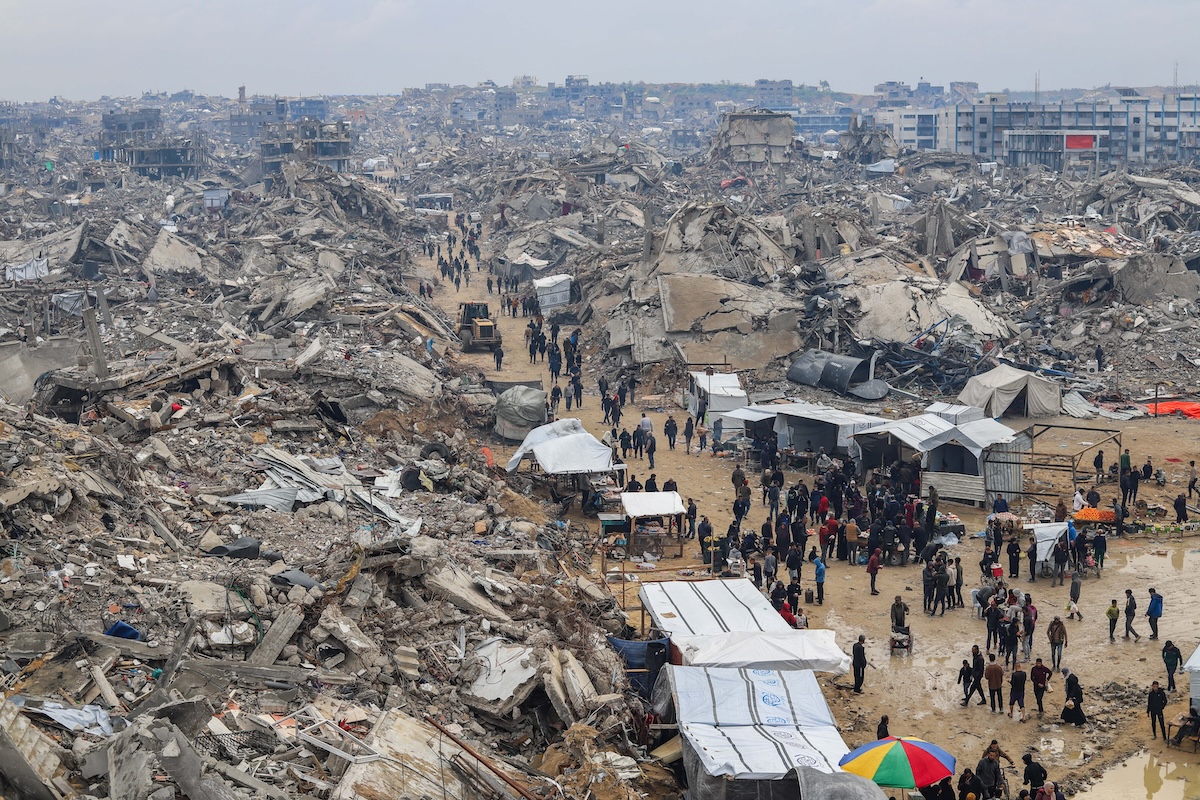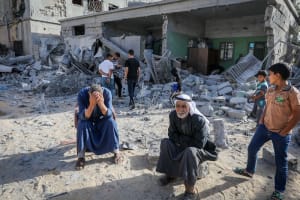WATCH VIDEO: Praying for Gaza - A biblical perspective on love and judgment

WASHINGTON —There is much controversy over President Trump's approach towards fixing Gaza.
Here in Washington, Jordan’s King Abdullah is in town, Egypt’s President Sisi is supposed to come, the Saudi foreign minister is here, the Egyptian foreign minister is here, and there's a lot of concern over what should happen in Gaza, and about the right way forward.
I see a lot of anger in the Arab media, and even some in the Israeli media, but I also see Christians struggling with the issue of showing love and compassion for the Palestinian people.
I want to just say right up front that as Christians, as followers of Jesus Christ, as evangelicals, we must love the Palestinian people of Gaza.
We need to love our neighbors. Even if you consider the Gazan people enemies – and of course many in Gaza really are enemies of Israel, enemies of Christianity, and of peace and freedom – we are still commanded to love them.
How do we apply Jesus' command to love our enemies?
I think this is so important because we're not talking about theory right now.
We're not talking about it in principle. Yes, of course, we should love our neighbors in principle, but we should also love our enemies.
We have a real time opportunity right now.
I see Christians struggling with love being a non-negotiable and I understand that struggle, especially for pro-Israel Christians who may feel conflicted about whether they even want to love the people of Gaza.
I'm not from Texas but there’s an expression Texans use when they don’t like some people or a country that says, “Nuke them till they glow.”
That’s not to say with nuclear weapons necessarily, it’s a way of saying just go scorch the earth – we’re not even going to deal with them.
I'm not seeing that literal phrase on social media but I do see a lot of this sort of sentiment, asserting that the Palestinians deserve it.
I don't want to get into exactly who in Gaza deserves what but I will say that I believe the people of Gaza are experiencing judgment. I mean real, actual biblical judgment.
I believe that they are experiencing the consequences and the judgment that comes from cursing Israel every day for the past almost 77 years since the modern Jewish state was prophetically reborn.
It’s true that most of the people of Gaza hate Israel and want to annihilate it.
They elected Hamas, a genocidal terrorist organization, to lead them right after Israel withdrew from Gaza back in the late summer-early fall of 2005.
Israel completely withdrew and then-Israeli Prime Minister Ariel Sharon said, "Look we don't want to control you in Gaza; you have beachfront property, you have natural gas off your shores, you have industrious, hardworking and smart people. Go build a Palestinian paradise for yourselves. We're not going to run you anymore, we're not going to control you, we're not going to “occupy” you (if you want to use that expression) we're not doing it anymore. We're leaving."
The Disengagement Plan, as it was called by Sharon, was hugely controversial in Israel.
Even Prime Minister Netanyahu, who was then the finance minister, was against it, as was a great hero of the Jewish people, Natan Sharansky.
Why were they against it?
Because they said if you give away all that land without an actual peace treaty giving specific rights and responsibilities, you're going to reward Hamas, you're going to reward radicalism, and you're going to get more of it.
Netanyahu said you're going to create “Hamastan,” like Pakistan or Afghanistan – an actual terrorist state, a terror base camp in Gaza – and that's exactly what has happened.
Netanyahu was right and Natan Sharansky was right.
The question is what do we do about it now?
It is true that when they got this “gift” (other people may not see it that way) of freedom and their sovereignty in 2005, the Palestinian people failed to build a Palestinian Paradise.
They could have, but they didn't. Instead they elected an outwardly and openly-committed genocidal terrorist organization called Hamas, a Palestinian extension of the Muslim Brotherhood.
They built a terror base camp and they have attacked Israel ever since. Now they're suffering the consequences.

Still, as Christians we are commanded to love them. We are commanded in both the Old Testament and the New: “Love your neighbor.”
People may say they're not our neighbors, these are our enemies, but Jesus commanded us to love our enemies as well.
The question is, how?
I want to use the example of Nineveh and the Book of Jonah.
The prophet Jonah was told to go preach in Nineveh, the capital of the wicked, violent, and pagan Assyrian Empire.
Jonah said “Not gonna do it, it wouldn't be prudent, not at this juncture, not gonna do it.”
He didn’t know the language of George H.W. Bush back in the day, but that's essentially what he did.
So he got on a Disney cruise and he headed west. Not literally a Disney cruise obviously, I'm taking some liberties here, but he decided he wasn’t doing that, and chose to flee in the opposite direction.
We all know the story of how God got his attention and turned him around.
God put him inside a fish, a whale or something, which vomited him back into the game.
He takes a shower (hopefully) then Jonah goes and preaches judgment for 40 days and 40 nights, walking all through Nineveh.
At this point he's decided that if God's going to judge Nineveh, this wicked capital of Israel’s worst enemies, then good, fine. I will do that.
Then the people of Nineveh, from the king on down, heard about the God of Israel.
They heard that the God of the universe was going to judge them and destroy them, and they asked, “what can we do to appeal to Him? How can we say that we're sorry, that we'll repent?”
They end up repenting, and God relents.
But Jonah is furious.
He didn't want that outcome.
It wasn't that Jonah was scared to go to Nineveh, that wicked and violent capital of the worst enemy of Israel, it was that he didn't want them to repent.
When they did, Jonah said, ‘that's exactly what I feared you would do, God. That’s what I was upset about.’ Jonah felt they deserved judgment.
And now, do the people of Gaza also deserve judgment after almost eight decades of hatred – sheer raging, violent hatred against Israel and the Jewish people?
Sadly yes.
That’s exactly where the Abrahamic Covenant goes.
In Genesis 12:3 God says, to Abraham (and his descendants Isaac, Jacob, Judah and Israel, that’s the line): “I will bless those who bless you, and whoever curses you I will curse.”
I think that’s what we're seeing in Gaza.
However, the story of Nineveh tells us even when a nation, a people, a leadership, or a capital is condemned by God for judgment for their wickedness, God still loves them.
He still wants them to repent.
I can't tell you what the right way forward is in Gaza.
I'm grateful that President Trump has decided America's going to show bold leadership there, and I know he even shocked Netanyahu.
I think Netanyahu never expected the president of the United States to say in effect, “I'm going to own Gaza, we're going to figure this out.”
How that might work is extremely controversial here in Washington, and we'll be covering that all on ALL ISRAEL NEWS and ALL ARAB NEWS as it unfolds.
But now, as Christians our heart has to be one of compassion.
What's the most compassionate geopolitical solution for the people of Gaza?
What fits with God's prophetic plan for the people of Gaza?
Spiritually these are lost people. These are sheep without a shepherd.
They have been guided by demon-possessed Hamas leaders, but they’re not that dissimilar, are they, from the people of Nineveh?
And God sent Jonah to preach repentance – well Jonah didn't preach repentance exactly, he preached judgment – but the people of Nineveh still heard it and they did repent.
Jonah wasn't giving them an option to repent but they heard judgment and their instinct was to repent.
They wanted to know whether the God of the universe, the God of Israel, might let them repent.
Would he relent?
Yes, that's exactly what happened.
So as Christians please let’s pray for the people of Gaza.
We are not in a position to figure out the exact geopolitical right solution about where they should live, about how the Gaza Strip should be cleared and rebuilt into something better, even something basic.
I've been in Gaza and it is an apocalyptic nightmare as far as the eye can see.
These people are under judgment, and they are facing not only death and misery in Gaza but they're facing an eternity without God, an eternity in hell.
Many of them have died already, so let's be praying for those still in Gaza.
Let’s pray for their salvation.
Let us not abandon what Jesus commanded us: to love your neighbor, love your enemy.
Even if we don't know exactly how, let's just pray with compassion for the people of Gaza.
Just as God said to Jonah at the end of the Book, “Should I not have compassion on people? They literally don't know their right from their left, they don't understand right and wrong. Should I not have compassion on them?”
God does, and we must.
Please let's be praying for the people of Gaza, and also loving them, as Christians must.

Joel C. Rosenberg is the editor-in-chief of ALL ISRAEL NEWS and ALL ARAB NEWS and the President and CEO of Near East Media. A New York Times best-selling author, Middle East analyst, and Evangelical leader, he lives in Jerusalem with his wife and sons.
You might also like to read this:















